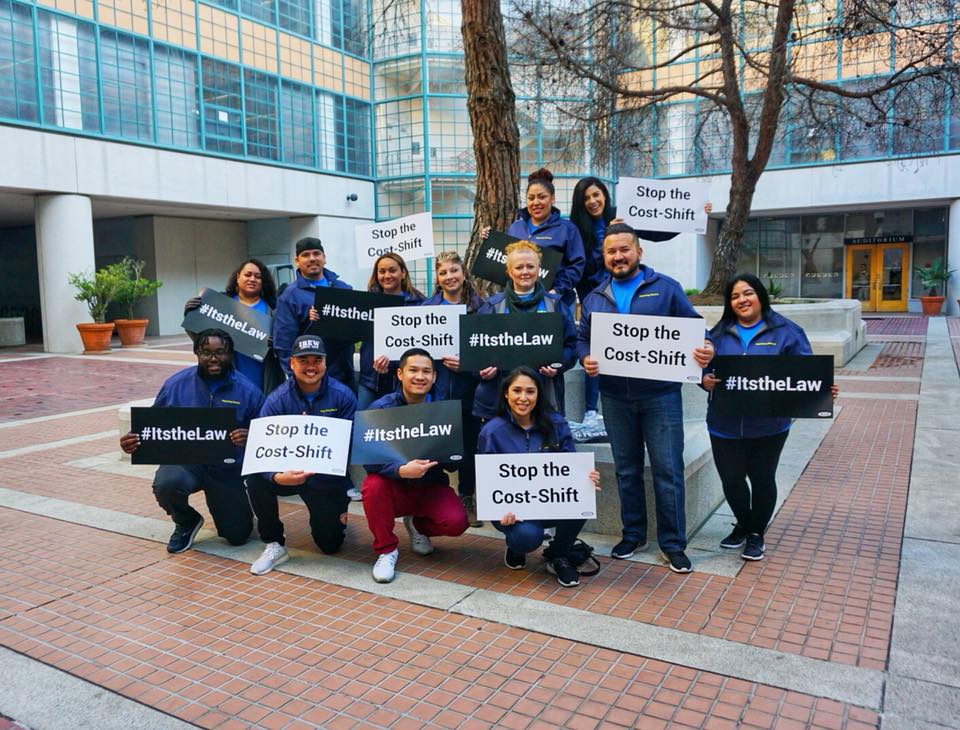
Local 1245 Organizing Stewards at the CPUC hearing in San Francisco. Photo by Steve Marcotte
In just a few short years, Community Choice Aggregators (CCAs) have drastically changed the energy marketplace in California, and as they continue to expand, additional regulation is needed to ensure that the system is not disadvantaging the customers who remain with the traditional utility companies.
One such regulation is Resolution E-4907, which came before the California Public Utilities Commission (CPUC) on Feb 8, 2018. This resolution sought to address an inequitable shifting of costs that has been occurring due to the influx of CCAs.
Currently, all electricity providers in California are required to forecast the number of customers they will have, and demonstrate that they have sufficient power to serve them (this is known as “Resource Adequacy”). Based on current circumstance, CCAs appear not to be required to meet their Resource Adequacy obligations for the calendar year in which they first provide new or expanded service. As a result, utilities are buying power for the customers that are switching over to CCAs, leaving those customers who remain with their utility responsible for picking up the tab.
CPUC Resolution E-4907 would protect utility customers from paying more for Resource Adequacy than they should, and would also protect the integrity of the state’s Resource Adequacy program that is supposed to ensure reliable electricity for all customers.
“The resolution requires that all CCAs meet the same forecasting and contracting process for Resource Adequacy as all other load-serving entities prior to serving new customers,” explained IBEW 1245 Organizing Steward Alvin Dayoan. “This resolution is really important as we see new CCAs developing within PG&E territory.”

Photo by Alicia Rodriguez
IBEW Local 1245 teamed up with the Equitable Energy Choice for Californians coalition for an emergency action at the CPUC hearing in San Francisco to demonstrate support for the resolution. Clad in their IBEW 1245 tee shirts and jackets, an enthusiastic group of Organizing Stewards descended on the hearing, turning heads everywhere they went.
“When 1245 walked in the building, I immediately saw and felt the impression we made,” said Organizing Steward Cynthia Lopez. “I realized I was a part of something so big.”
“The parties in opposition to the Resolution had a press conference by the CPUC building and outnumbered us slightly,” reported Organizing Steward Taf Gwarada. “But when the hearing began, we strategically positioned ourselves in the middle of the room to heighten our presence.”
The opposition to the resolution was vocal, dominating the mic during most of the hearing, but they failed to articulate any compelling reason why E-4907 should not be enacted.
“All persons who took the time to speak against E-4907 had the wrong argument, and sounded as though they were under the impression that the CPUC wanted to do away with the CCAs entirely,” said Organizing Steward Felicia Martinez.

CPUC Commissioner Martha Guzman Aceves (left) shakes hands with Organizing Steward Alicia Rodriguez. Photo by Steve Marcotte
At the end of the day, the CPUC bucked the opposition and voted unanimously in favor of implementing the resolution.
“I was very happy to hear the Commissioners go into detail and explain why they were all in support of resolution E-4907,” said Organizing Steward Brenda Balthazar. “I was proud to be a part of and witness this hearing, mostly because I speak with customers on a day-to-day basis about rate costs, generation and delivery.”
“The CPUC Commissioners are real people doing a real job,” said Organizing Steward Kristen Rasmussen. “They listened to everyone, and then addressed their concerns when delivering their decision.”
“We achieved a major victory that day. The CPUC Commissioners saw our message and the value of the resolution, resulting in a vote to protect our customers,” said Organizing Steward Lorenso Arciniega. “This experience renewed my faith in the CPUC Commissioners and their focus on the greater interest for the people of California.”